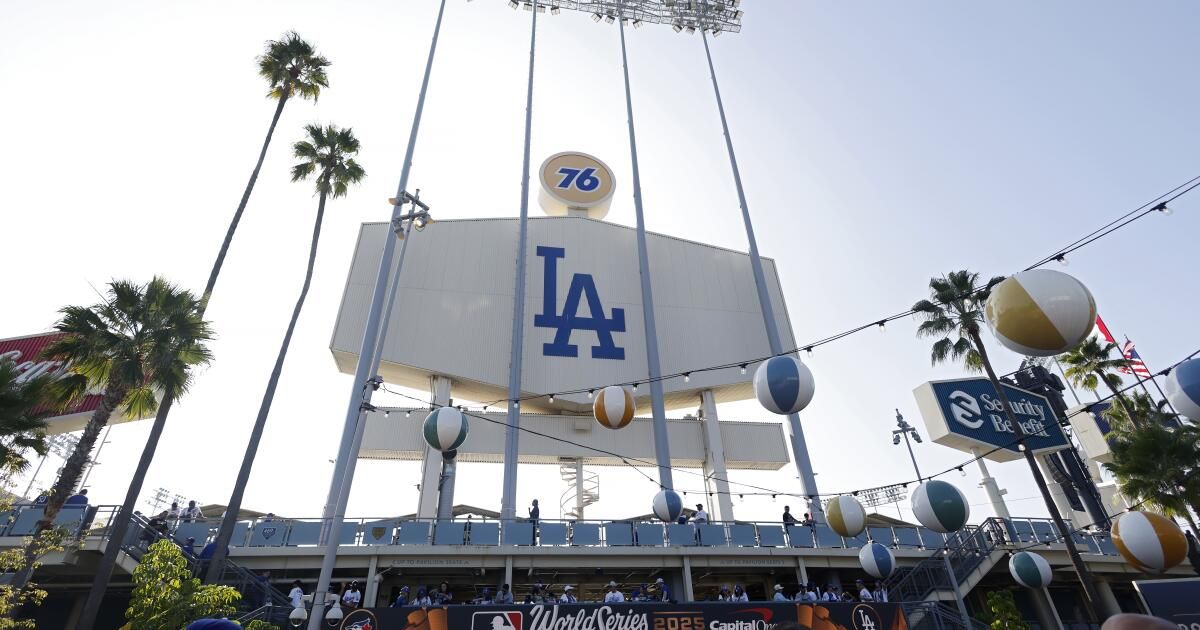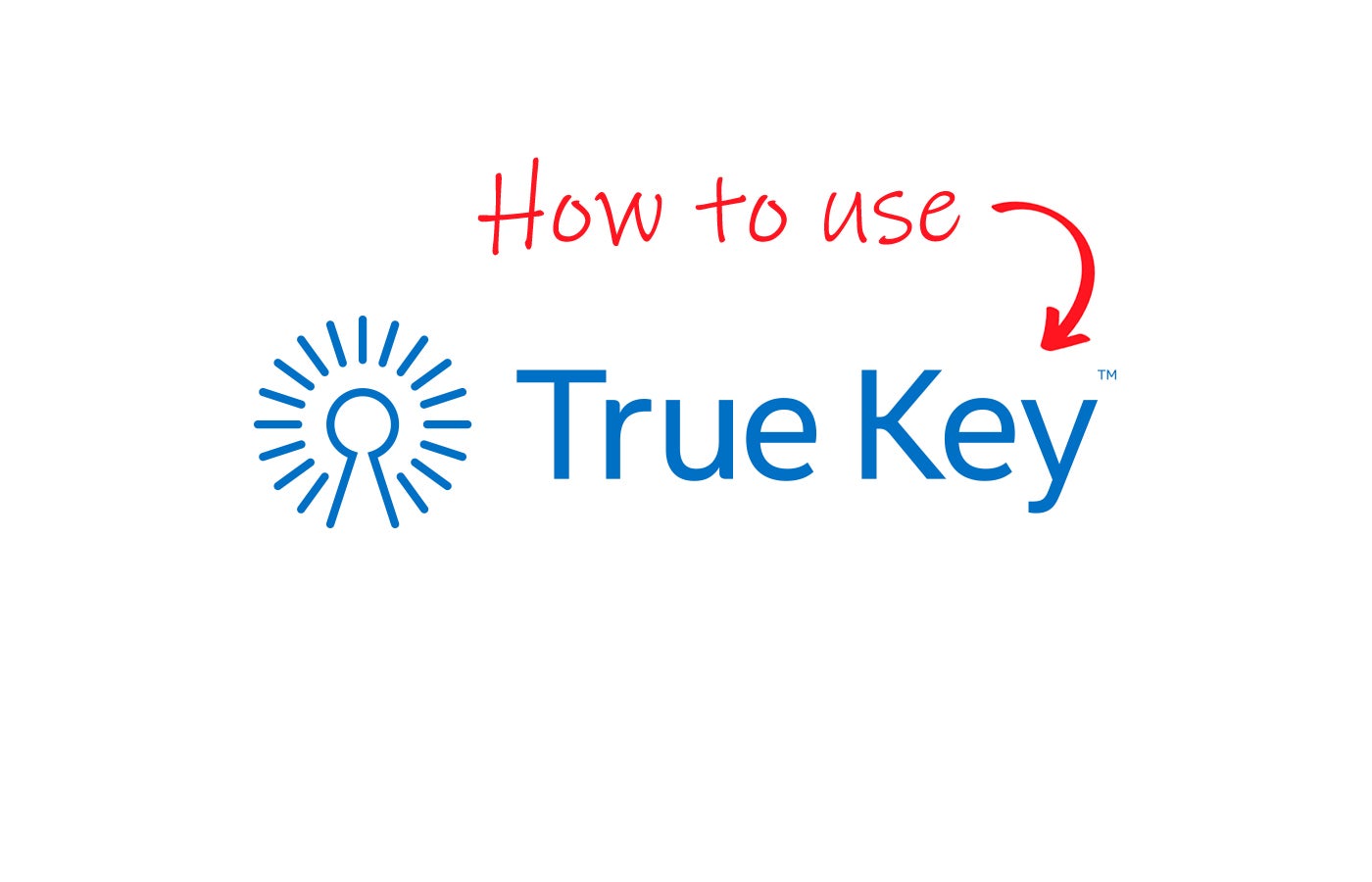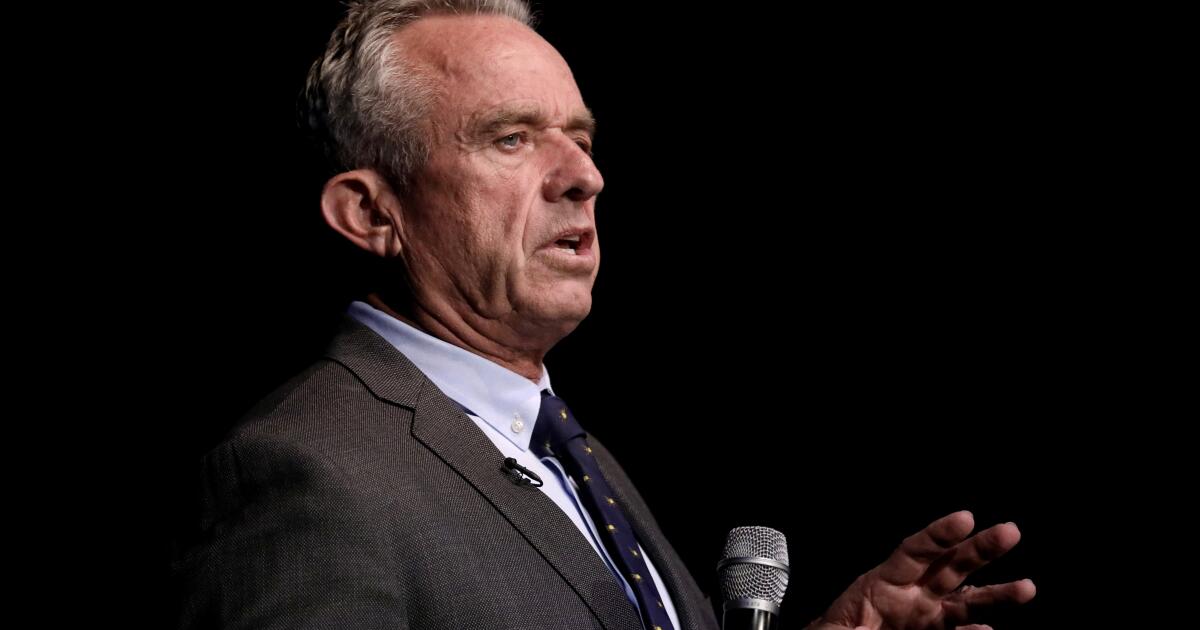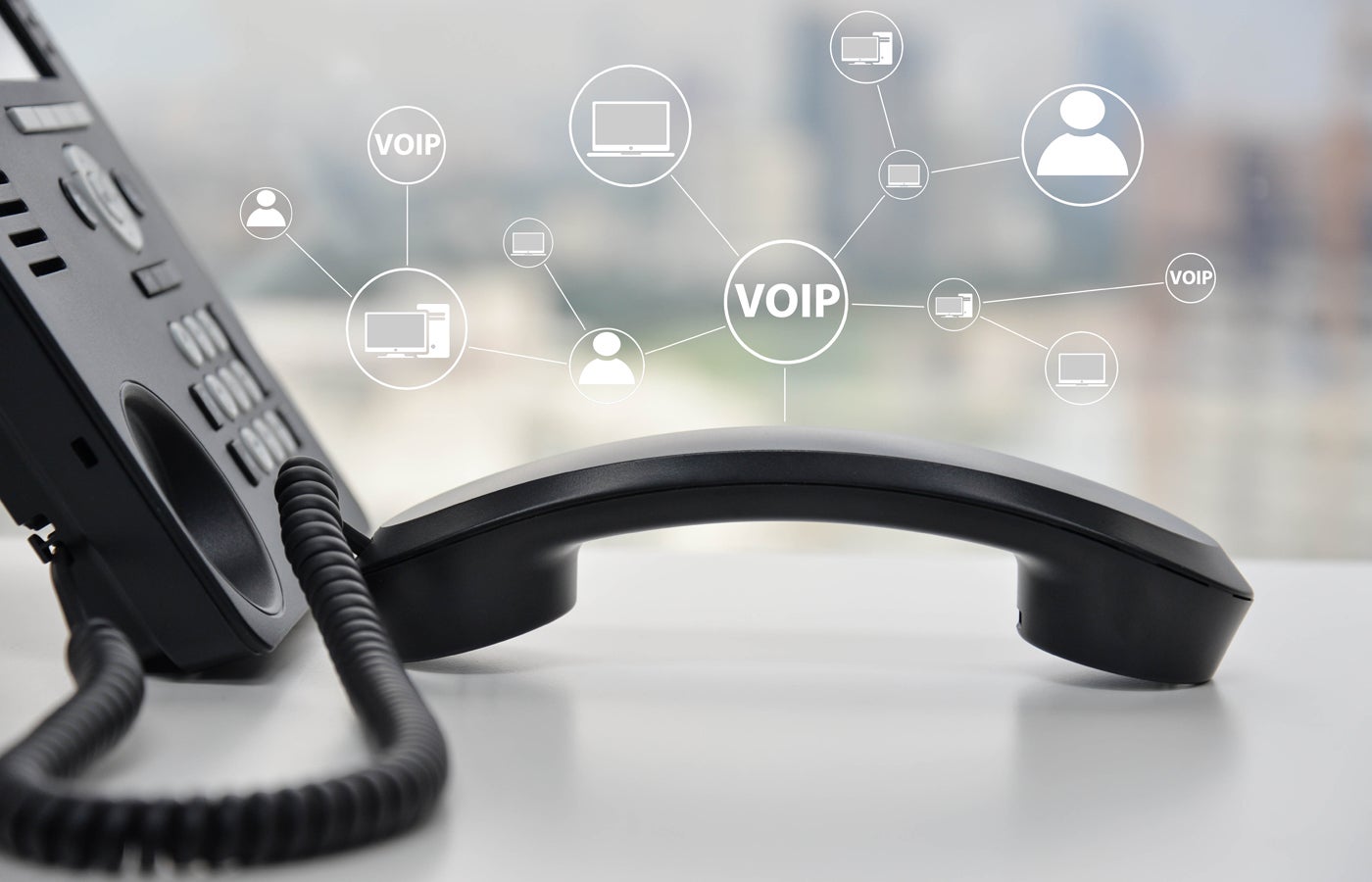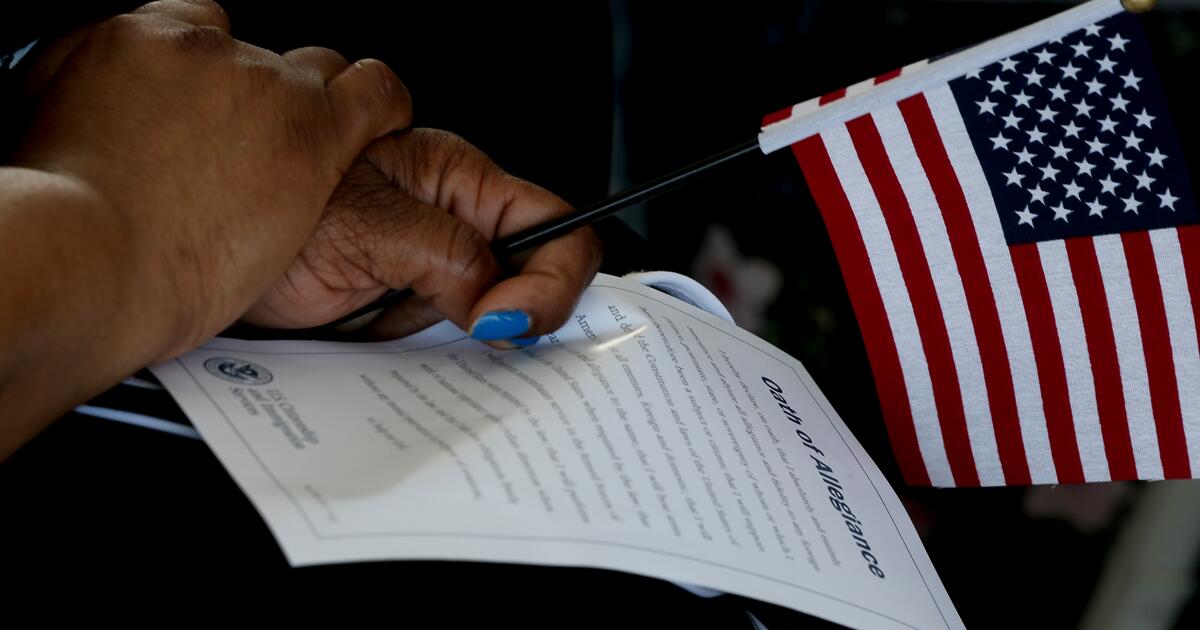Toronto— Louis Acosta, a Santa Clarita Dodgers fan, flew to Toronto on Friday to support his hometown team in its fifth World Series appearance in the last 9 years. During Game 1 at Rogers Center, he proudly wore his Dodgers jersey and cap amid the opening ceremonies.
Before the game, Acosta visited a bar inside the stadium where a Blue Jays fan offered to buy him a beer after noticing his Los Angeles team gear. “It was strange,” Acosta said, laughing. “The guy didn't care that I was a Dodger fan as long as I didn't vote for Donald Trump.”
It might seem strange that the World Series and politics are so intertwined this year. Baseball games are often where people go to escape discussions about the polarized state of our country and enjoy supporting their favorite players and teams. But this season, Canadians are crazy about baseball, fans of rooting for the Blue Jays, Canada's only Major League Baseball team. They are also politically angry for reasons that are clear.
Since President Trump was inaugurated in January, he has done everything he can to antagonize Canadians, suggesting that Canada should become the 51st state of the US, referring to former Canadian Prime Minister Justin Trudeau as “governor” and, most importantly for Canada's economic well-being, imposing high tariffs on Canadian goods entering the US.
On Saturday, Trump announced an additional 10% tariff on Canada, imposed simply because he didn't like a television ad. The commercial, paid for by the province of Ontario to air during the World Series, features President Reagan's anti-tariff rhetoric in a 1987 radio speech. And with the United States being Canada's largest export market, economic sanctions against Canada are beginning to take effect.
While there is a complex mix of personalities in every country, Canadians are generally considered friendly and thoughtful, and not prone to outbursts of nationalistic anger. At sporting events you rarely see groups of Canadians shouting “We're number one!”
In Friday night's Game 1, which the Blue Jays won handily 11-4, Toronto fan Riley Keast explained how he saw the difference between Canadians and Americans.
“Historically, Canadians have had what you might call a soft patriotism, where there's not a lot of flag-waving or aggression,” said Keast, who works in Toronto's financial industry hub. “With Trump's tariffs everything changed and now you can see Canada's strong patriotism.”
A walk through the neighborhoods of Toronto reveals signs of Canadian pride and their willingness to fight against what many see as unnecessary humiliation. In grocery store windows there are signs that say “Proudly Canadian,” and inside the store there are notes indicating which products are made within its borders. In liquor stores run by the Ontario Liquor Control Board, a government agency, there are shelves of “U.S. Alternatives,” where American wines, including California varietals, were once sold.
A mother at the game, who had her and her daughter's faces painted with the Blue Jays logo, joked that she “doesn't keep Donald Trump up at night.” When I stopped to talk to a construction worker wearing a Blue Jays hoodie, he proudly declared, “This isn't a series between Toronto and Los Angeles, it's Canada versus the United States.”
He obviously didn't believe the Canadians would soon be in combat with their American counterparts, but his comments weren't entirely hyperbolic either. The current tension has a historical context. Alan Taylor, a Pulitzer Prize-winning history professor at the University of Virginia, told me that Trump is not the first American president to talk about the possibility of annexing Canada. In fact, in the 19th century the idea was quite common.
“When the United States, Britain and Canada were allies after World War I and World War II, and we needed each other during the Cold War, this idea of annexation went away,” Taylor said. “So the fact that Trump has decided to accept this in such an insulting way to the people of Canada, as if they don't value their own sovereignty, shows his complete ignorance of Canada. To be frank, it's unstable.”
Meanwhile, Blue Jays caps and jerseys were ubiquitous throughout Toronto during the team's first World Series home games since 1993. Women had their nails painted with the logo and a festive atmosphere prevailed in Canada's largest city and across the country.
During the games, no one booed when the U.S. or Canadian national anthems were played, unlike how U.S. fans booed “O Canada” during the 4-Nation Showdown in February, and at several sporting events since. The rudest thing Blue Jays fans received was chanting “We Don't Need You” when Dodgers superstar Shohei Ohtani was at bat, a reference to Ohtani choosing Los Angeles over Toronto when he signed as a free agent in 2023. Technically, the chant isn't accurate, as the Blue Jays managed just four hits during their Game 2 loss.
This week, back in Los Angeles for Games 3, 4 and 5, the Dodgers will play not only Toronto, but also “Team Canada.” And, interestingly, both first basemen have Canadian roots. One is Vladimir Guerrero Jr., the Blue Jays' Golden Glover who was born in 1999 while his father was starring for the now-defunct Montreal Expos (who moved to Washington, DC, in 2005). The other is Dodgers 2024 World Series MVP Freddie Freeman, who was born in Southern California but has dual citizenship, as his parents were raised in Canada. Freeman even played for Canada in the World Baseball Classic in 2017 and 2023 in honor of his mother, who died in 2000.
Dodgers fan Louis Acosta said that if he makes it to this week's games in Chavez Ravine, he will be as generous to the Canadians in town to cheer on the Blue Jays as their fans were to him in Toronto. “If I see someone wearing a Blue Jays cap, I'll extend my hand and say, 'Welcome to Los Angeles. Can I buy you a beer?'”
Kelly Candaele produced the documentary “A League of Their Own,” about her mother's years playing in the All-American Women's Professional Baseball League. He was born in Vancouver, Canada.

